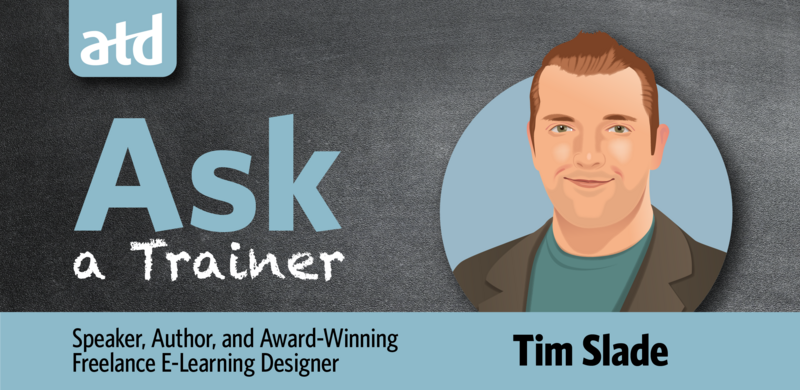ATD Blog
Ask a Trainer: SMEs Who Create Their Own Learning Content
Wed Feb 26 2020

Hi, Tim.
I lead a learning team for a large manufacturing company, and we’ve been having ongoing issues with our subject matter experts creating and delivering their own learning content. While we appreciate their enthusiasm for wanting to help their people do better, the content they create can hardly be called learning. They’re shoving a bunch of bullet points onto slides and lecturing to their teams.
During the past several months, I’ve met with many of these subject matter experts and tried to explain why their content isn’t helping their teams. I’ve also asked them to work through the learning team when creating any new learning content, but it doesn’t help.
How can we get our subject matter experts to stop creating bad learning content and start working with us? Help!
First, let me say that I feel for you. I can’t tell you how many times I’ve been in situations where I’ve discovered my subject matter experts were creating and running their own rogue “training” programs.
The fact is that this is far more common than you may realize. I think it’s natural (and not necessarily a bad thing) that any good leader or expert wants to share their knowledge with their teams. The real problem is when their efforts are misguided or ill-informed, or when their intentions are doing more harm than good.
So, how can you get your subject matter experts to stop creating their own learning content? I think that’s the wrong question for me to answer. Why? Your subject matter experts are going to do it whether you like it or not. The real question is: How can I get them to use the learning team’s instructional design expertise when they’re creating their own learning content?
Here are some tips that might help.
Avoid Criticism
This first tip is hard, I know. It’s hard to look at their sad little PowerPoint deck and not tell them everything that’s wrong with it. It’s hard not to explain why 15 bullet points on a slide combined with an hour of lecture isn’t going to get the results they’re seeking.
However, you must do everything you can to avoid criticism. If you’re fortunate enough to have them share their content with you, offering your criticism will quickly drive them away from you. It won’t stop them from creating their own content; they’ll just stop showing it to you. This leads me to my second tip.
Offer Collaboration
Like the old saying goes: “If you can’t beat ’em, join ’em.” This is not to say you should give up and encourage them to create their bad content. Instead, offer your assistance and collaboration rather than your resistance.
Avoid telling them why their content won’t work and start by talking about how you can help them make it better. Once they realize you’re offering a helping hand instead of monopolizing their ideas, it’ll help you build some much-needed trust. And this leads me to my final tip.
Take Your Time
Building the trust necessary for your subject matter experts to welcome you in is going to take time. If you try to rush the process, you run the risk of scaring them off. Start with small wins and ease your way in. For example, offer to observe one of their sessions, provide some positive feedback, and build the relationship. Before you know it, they’ll be reaching out for your assistance.
I wish you the best on this one. I hope these tips are helpful!
Tim
P.S. Have you ever had to deal with subject matter experts creating their own learning content? What other strategies have you used in the past? Comment below to share them.
Do you have a learning question you’d like me to tackle? You can email them to [email protected]. Also, visit the Ask a Trainer hub to check out all of your questions and my answers.
We welcome your comments and engagement on these posts. All posts are reviewed to ensure appropriateness based on ATD’s requirements for postings in our online communities.
Please note: Content shared in this column is provided by the author and may not reflect the perspectives of ATD.
You've Reached ATD Member-only Content
Become an ATD member to continue
Already a member?Sign In

